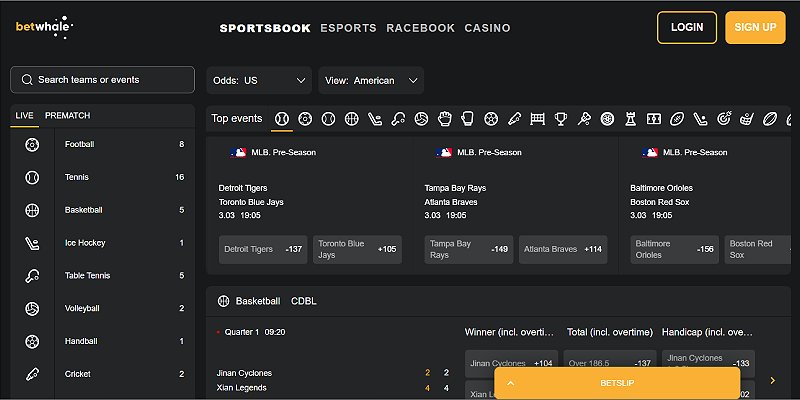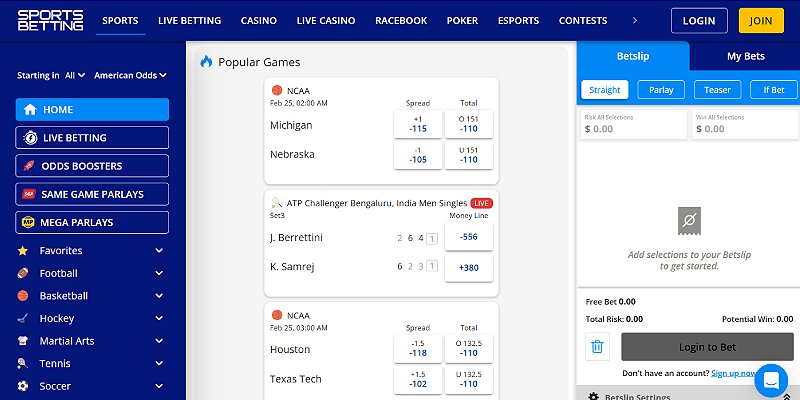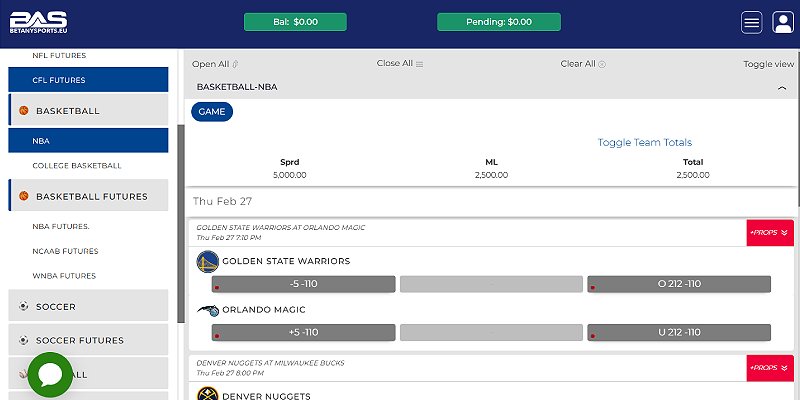Maryland was one of the first states in the US to legalize sports betting, and the industry is thriving. The best Maryland sports betting sites cover all your favorite sports and come with the biggest bonuses out there.
The best option overall? BetWhale. With its 150% sports betting welcome bonus, amazing live betting page, and thousands of daily markets, this online sportsbook checks all the right boxes.
But before you get started, make sure to take a look at our full list below. We’ve got 9 other amazing options.
Let’s begin!
Best Maryland Sports Betting Sites
- BetWhale: Best overall
- BetOnline: Fastest payouts
- BetUS: 125% welcome bonus
- SportsBetting.ag: Amazing live betting site
- BetAnySports: Best market variety
- MyStake: Mobile-friendly sportsbook
- MyBookie: Biggest reload bonuses
- BUSR: Top pick for hockey betting
- Wild.io: Crypto-friendly betting site
- XBet: Easiest customer support live chat
Heads up about our links! Adblock might get confused so please disable it if you have any issues.
All of these sites are fantastic places to be for sports betting in Maryland, but each of them has its own pros and cons. Let’s take a closer look to find out more.
1. BetWhale – Best Maryland Sports Betting Site Overall

Pros:
- 150% welcome bonus
- Thousands of daily markets
- Mobile-friendly sportsbook
- Amazing live betting page
- Fast crypto payouts
Cons:
- Could use more reload bonuses
- Design is not the best
There isn’t a better site in Maryland for online sports betting than BetWhale. This is a tried and tested bookie that beats the rest of the pack for a few key reasons.
Maryland Sports Betting Markets: 4.9/5
There are thousands of betting markets at BetWhale. You’ll find more than 25 sports to bet on, and for a lot of these, there are tons of leagues and tournaments for which you can get odds.
Football and horse racing impressed us the most with their coverage here. Both have many different bet types.
If it’s eSports you want to bet on, you’re going to be spoiled for choice for markets at BetWhale as well. This site covers tournaments from all kinds of games, like Valorant and Age of Empires. Most of the matches can be live-streamed as well, bringing you even closer to the action.
Sportsbook Bonuses & Offers: 4.9/5
New to BetWhale? You can use the opportunity to sign up as a new player to get a 150% match on your first deposit. It’s rare to see 100% matches, let alone 150%. That’s a huge amount of extra online sports betting cash to get back as a new player. Use the promo code THEBOOST to activate it.
It’ll only need to be rolled over 10x, too. This rollover size is about average, which makes the offer itself all the more impressive.
However, one thing we would have liked to have seen added is a reload offer (or two). There don’t appear to be very many of these at the time of writing.
Fun fact: BetWhale is also one of the best Florida sports betting sites we could find.
User Experience & Banking: 4.9/5
The list of payment methods you can use to place a deposit at BetWhale is about 10 strong right now. Some examples include Visa, MasterCard, and Bitcoin.
You won’t get paid out instantly here, but for most methods, you should never have to wait more than a day or two to receive any cash you’ve won.
Using the BetWhale website is also quite an exciting experience. While it might not be the most attractive site aesthetically, its live betting and bet builder tools stand out, and its customer service (available via live chat and over the phone) is one of the best in Maryland.
Overall, BetWhale comes in with a very strong finish at number one. Its combination of markets and its fantastic welcome bonus are two of the standout factors that pushed it to the top spot in our rankings.
>> Score your 150% welcome bonus [BetWhale]
2. BetOnline – Best Maryland Sportsbook with Fast Payouts

Pros:
- $250 free bets bonus with no rollover
- Most payouts are processed within an hour
- Great site for horse racing betting
- Mobile-friendly sportsbook
- Hosts regular tournaments
Cons:
- Customer support is a bit slow
- Could use more reload bonuses
The vintage online sports betting site BetOnline has been at the forefront of the Maryland sports betting scene for many years now. Let’s find out what makes it one of our top picks today.
Maryland Sports Betting Markets: 4.7/5
BetOnline is one of the best sites to bet on major sports like tennis, soccer, and basketball. It covers tons of tournaments and leagues for each of these and more. You can bet on a whole lot more than just the top competitors.
Horse and motor racing are covered very well here, too. You’ll see a lot of prop bets for Formula 1, for example. And there are horse races from all around the world.
There aren’t many markets for eSports here, though. We’d like to see this added in the future so BetOnline can remain modern. It would also be good to see some markets outside of sports, such as for politics or finance.
Sportsbook Bonuses & Offers: 4.9/5
Use the promo code FREE250 on your first deposit of $100 or more at BetOnline to match it 50% up to $250, and you’ll get 100 free games to use on slots as well.
Sure, the minimum deposit is high. But then again, you don’t have to wager it at all. If you win anything with your free bet, that cash is going to be instantly withdrawable. And that saves a whole lot of time and effort.
User Experience & Banking: 4.9/5
At BetOnline, you’ll have over 15 payment methods to deposit and cash out. It’s a great list. Not only does this make life easier for players, but it also shows that BetOnline prioritizes the player experience, which helps it be more trustworthy.
The speed of the payouts also matters. Processing for many of these methods takes only an hour or so. It’s one of the best instant withdrawal casinos out there!
BetOnline also has one of the best Maryland betting apps for playing on the go. The mobile site looks classy in its design and features some of our favorite live betting tools.
It’s no wonder BetOnline has stayed in business for over 30 years. They continue to get just about everything right, particularly regarding their banking.
>> Grab up to $250 in free bets plus 100 FS [BetOnline]
3. BetUS – Best Bonuses of all Maryland Sportsbooks Online

Pros:
- 125% sign-up bonus
- Generous reload bonuses
- BetUS TV with live streams
- One of the most famous sportsbooks
- Amazing football coverage
Cons:
- Design could be better
- Some payouts are a bit slow
The bonus cash available for new sports players at BetUS is quite substantial. This site clearly goes all out with its offers.
Maryland Sports Betting Markets: 4.7/5
BetUS is a traditional Maryland online sportsbook when it comes to its choice of betting markets. It excels in sports like football and basketball, with great coverage of both pro and college leagues throughout the season.
The sportsbook falls short a little when it comes to up-and-coming online sports betting markets like eSports. We’d have liked to have seen more than just the big games, like League of Legends, covered here.
Sportsbook Bonuses & Offers: 4.9/5
The fiat currency welcome bonus for BetUS is very generous. It is a 125% welcome package, which can go up to $3,125 in total. This is how it works:
- 100% sports bonus of up to $2,500
- 25% casino bonus of up to $625
There are more Maryland sports betting promos up for grabs after this, too. BetUS also offers a 50% sports reload bonus, 25% back on all future crypto deposits, boosted odds, and a few extra deals.
User Experience & Banking: 4.7/5
We really like BetUS’s classic sportsbook design and the fact that it comes with loads of great sporting content through the BetUS TV feature. The customer service here is clearly prioritized, as you can call up the team and get through with ease most of the time.
Credit cards, cash transfers, bank wires, and a handful of cryptocurrencies are the only payment methods, though. We would have liked to have seen more than this.
>> Get up to $3,125 in welcome package [BetUS]
4. SportsBetting.ag – Best Online Sportsbook in Maryland for Live Betting

Pros:
- Amazing live betting page
- Super competitive cash-out odds
- Up to $250, no rollover on welcome bonus
- Payouts in under one hour
- Mobile-friendly sportsbook
Cons:
- Could use more reload bonuses
- Design is not the best
Next, we have SportsBetting.ag, our top Maryland sportsbook for live betting.
Maryland Sports Betting Markets: 4.7/5
At SportsBetting.ag, you’ll find a wide range of MD online sports betting markets. This site also covers pro and college sports betting.
We liked the range of tennis and golf betting lines, too, and found that soccer was well covered, with leagues worldwide.
The horse racing betting section could be more detailed, though.
Sportsbook Bonuses & Offers: 4.8/5
New players at Sportsbetting.ag can use the promo code WELCOME on their first payment to get a 50% up to $250 deposit match in the form of a free bet, as well as 100 free spins for slots.
You’ll need to meet a pretty high minimum deposit of $100 to claim this offer, but we think that Sportsbetting.ag makes up for this by not requiring you to play through the bonus at all. You can withdraw anything you win from either the free bet or the free spins.
User Experience & Banking: 4.8/5
SportsBetting.ag is another MD betting site with a strong list of payment methods. There are more than 10 to choose from, and the vast majority of these are cryptos like Bitcoin, Litecoin, and Ethereum.
These crypto coins also have the quickest payouts. You’ll get your funds back in an hour or so with these. The only thing we would change about the banking here would be to introduce a few eWallets for payouts.
>> Claim up to $250 in free bets at SportsBetting.ag
5. BetAnySports – Best Market Variety of all Online Sportsbooks in Maryland

Pros:
- Hundreds of daily markets
- Huge range of football betting markets
- Half-price stakes on certain bets
- Strong range of soccer markets
- Good list of crypto coins covered
Cons:
- Design could be better
- Could use more reload bonuses
Last but not least, we have BetAnySports, our top pick when it comes to market variety.
Maryland Sports Betting Markets: 4.9/5
As mentioned, BetAnySports is our top pick when it comes to market variety, but where it really shines is football. This means you’re going to get a lot of prop bets for any NFL fixture. And there’s plenty to go around for college football matches as well.
A couple of examples are the number of passing yards for a quarterback in any given game and the MVP of a match.
Outside of football, there’s a good range of markets for other major sports like baseball and boxing.
Sportsbook Bonuses & Offers: 4.7/5
BetAnySports is currently offering a 25% match up to $500 to new players who make a payment of $25 or more when they first sign up. It also features an exclusive $600 cash bonus on your first deposit.
User Experience & Banking: 4.7/5
The BetAnySports website isn’t the easiest we’ve ever used. The sitemap requires you to click around one or two more times than you really should have to get to certain parts of the site.
You’re going to be able to place your deposits with a strong list of cryptocurrencies, plus cards and bank transfers, although eWallets do not seem to be covered.
>> Get your $500 welcome bonus [BetAnySports]
How We Ranked the Best Maryland Sports Betting Sites
Maryland Sports Betting Markets
This is where we look at the number of lines a bookmaker allows you to bet on. These should cover a wide range of leagues and tournaments across plenty of different sports to suit all kinds of players.
Quality of Betting Odds
If a bookie has good odds, it means that our wins will be rewarded with more cash. It’s pretty important, therefore, that this is one of the main things for an MD bookie to get right.
Sportsbook Bonuses & Offers
We always expect to be greeted by a new MD betting site with a good welcome bonus. Ideally, this will be a free bet with a low rollover. Extra free bets, boosted odds, and other additional promos are also good to see.
User Experience
A well-designed website goes a long way, both on mobile and desktop. These sites should look good and be easy to use. They should also feature tools like bet slips and live betting features.
Banking
It’s always good to see many ways to pay. These could include cards, eWallets, crypto coins, and more. Other aspects of banking that we look into are deposit and withdrawal limits, fees, and payout speed.
We used similar benchmarks when ranking the best California sports betting sites and the best online sportsbooks in Texas.
Why Is BetWhale the Best Maryland Online Sportsbook?
BetWhale is the best online sports betting site in Maryland despite only being around for a couple of years. Here’s why.
- Great Mobile Experience: BetWhale is a good site for Maryland mobile sports betting. It’s really easy to use on the go.
- Biggest Bonuses: There’s a fantastic deposit match waiting for all new players at BetWhale – including their 150% welcome package for sports wagering.
- Live Streaming: BetWhale offers a very impressive selection of sports and eSports matches that you can watch live.
Best Maryland Sports Betting Sites – FAQs
How Do I Find the Best Betting Odds in Maryland?
You can use odds comparison tools to find competitive Maryland betting odds. That being said, all of our top picks have strong odds, too.
Which Maryland Betting Site Has the Best Bonuses?
BetUS offers the best bonus in Maryland overall, but BetWhale, BetOnline, and the rest of our top picks also have good deals.
Which Payment Methods Can I Use at Maryland Betting Sites?
Credit cards, bank transfers, and crypto coins are all common payment methods in the MD sports betting market.
Is it Safe to Bet on Sports in Maryland?
Yes, the legal sports betting scene in Maryland ensures a higher degree of safety. All of our top picks are safe places to play.
What is the Best Sports Betting Site in Maryland?
BetWhale is the best sports wagering site in Maryland. It has great odds, markets, and promos.
Is Sports Betting Legal in Maryland?
Yes. The sports betting legislation that legalized online gambling in Maryland was passed in 2020, and players have been enjoying their betting since.
Comparing the 5 Best Maryland Online Sports Betting Sites
BetWhale: Here’s your number one spot for sports wagering in Maryland overall. BetWhale is the place to be, and it offers new players 150% back on their first deposits.
BetOnline: The sheer number of payment methods and the speed of the payouts really stood out to us about BetOnline. So, too, did the $250 free bet that players can get with the promo code FREE250, plus 100 free spins.
BetUS: BetUS offers some great bonuses, including welcome offers. Sign up and score your 125% welcome package of up to $3,125.
SportsBetting.ag: Take a look at SportsBetting.ag if you want to find the best live betting tools in Maryland. Their welcome bonus is a $250 free bet and 100 free spins, and you can get it with the promo code WELCOME.
BetAnySports: If you want to bet on football, check out BetAnySports for the widest range of markets. When you first sign up, you’ll also get a 25% deposit match of up to $500.
How to Get Your Online Maryland Sports Betting Account
There are four steps to take to get an account with the best Maryland sportsbook, BetWhale. The process looks like this:
Step 1: Complete the Registration Page
- Go to BetWhale’s homepage
- Hit the banner on the homepage
- Enter the details required
Step 2: Verify Your Account
- Click the link in your email inbox
- Upload a copy of your ID if paying with a fiat
- Wait for this to be accepted
Step 3: Make Your Deposit
- Choose a payment method from the cashier
- Enter more than the minimum deposit
- Follow the steps to make that payment
Step 4: Place Some Bets
- Choose some markets
- Enter your stakes
- Place your bets before events or in-play
Tips for Using the Best Maryland Sports Gambling Sites
Find Competitive Odds for Your Top Sports
Many Maryland online sportsbooks have different odds from one another. It’s worth taking the time to find out which has the best odds for your favorite sports so that you can get more for your wins.
Grab Free Bets for New Players
A lot of online sportsbooks in Maryland offer bonus bets and more to new players. It can be a good idea to get your hands on a few of these while you search for your new favorite site.
Understand Maryland Sports Betting Law
You’ll need to be at least 21 years old to be able to bet on sports in Maryland. There are a few other stipulations, too, so make sure to do your research before you begin.
Note the Existence of the Maryland Lottery and Gaming Control Agency
The Maryland Lottery and Gaming Control Agency is the company to talk to if you ever want to ask a question about online sportsbooks in Maryland. They can set the record straight on any queries you have.
Pick the Right Betting Apps in Maryland for Mobile Gambling
Some Maryland sports betting apps are a lot better than others. Certain sites, such as BetOnline, are much easier and more enjoyable to use on a mobile device. We encourage predominant mobile players to research mobile compatibility before choosing a site.
Be Safe with Sportsbooks in Maryland
Maryland sports betting online is meant to be about having fun, not chasing your losses. For this reason, we encourage all players to make the most of safe gambling tools. Deposit limits and time checks can help you stay in control of your gameplay.
What’s Your New Favorite Maryland Betting Site?
When it comes to sports betting, Maryland is ahead of the game. The bookies here are packed with quality in terms of their lines (live or non-live), promos, odds… you name it.
BetWhale is the site to do all of these things the best, but BetOnline, BetUS, etc., are really not far off the pace. We recommend trying out a few of these sites and getting their welcome bonus offers as you go. So, now it’s over to you. Good luck!
DISCLAIMER: The information on this site is for entertainment purposes only. Online gambling comes with risks. There’s no guarantee of financial gain, so you should only gamble with what you can afford to lose.
While gambling can be fun, it can also be addictive. If you think you are developing a gambling addiction problem, call the National Gambling Helpline at 1-800-522-4700 to speak with a professional.
The information on this site is for entertainment purposes only. Our guides and all gambling sites are 21+. Also, check with local laws if online gambling is legal in your area.
For free online gambling addiction resources, visit these organizations:
